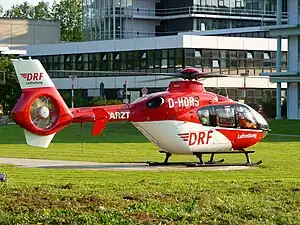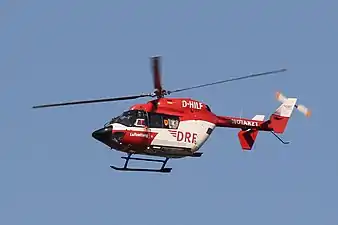DRF Luftrettung
The DRF Luftrettung (formerly Deutsche Rettungsflugwacht e.V.) is part of the German emergency medical services as a branch of the air medical services. The DRF Luftrettung and its subsidiaries operate in Germany, Austria, and Liechtenstein. The organization's headquarter is in Filderstadt.
 | |
| Founded | 6 September 1972 |
|---|---|
| Headquarters | Filderstadt |
| Services | Air medical services |
| Peter Huber [1]
Krystian Pracz [1] Rudolf Böhmler [1] | |
| Subsidiaries | Northern Helicopter GmbH AP3 Luftrettung GmbH |
Revenue | €147 million (2019)[2] |
Staff | 799 (2019)[2] |
| Website | DRF Luftrettung |
Formerly called | Deutsche Rettungsflugwacht e.V. |
History
The accidental death of a young boy, Björn Steiger, on May 3, 1969, revealed an availability gap in rapid emergency medical care. His parents, Ute and Siegfried Steiger, then founded the rescue service foundation Björn Steiger e.V. (today Björn Steiger Foundation).[3]
After presentations by Siegfried Steiger at the individual police stations in the operational radius around Mainz, the Björn Steiger Foundation started the first, six-week pilot test in cooperation with the German Red Cross (General Secretariat Bonn).[4] Under the medical direction of Rudolf Frey (University of Mainz), a fully equipped rescue helicopter of the type Alouette 3 was in operation. On September 6, 1972, the "Deutsche Rettungsflugwacht German Air-Rescue e.V." (abbreviated: DRF)[5] was founded as the first civilian air rescue organization in Germany.[6]
The DRF was financed and built up by the Björn Steiger Foundation, which also supported the DRF in terms of content.[7] For this reason, from 1972 to 2008, the "Steiger Star" was part of the logo of the DRF, as well as the addition "An initiative of the Björn Steiger Foundation" attached on each rescue helicopter.[8] In addition to Ute and Siegfried Steiger, the founding members of the DRF also included Fritz Bühler, founder of the Swiss Air-Rescue Service (today's REGA). Siegfried Steiger, as President of the Björn Steiger Foundation, became 1st Chairman of the DRF and Fritz Bühler, as President of REGA, became Vice Chairman of the DRF.[9] On March 19, 1973, the first rescue mission of the DRF helicopter stationed in Stuttgart took place.
On 23 January 2018 a DRF helicopter was involved in an accident after having taken off from Karlsruhe/Baden-Baden Airport for a practice flight. The helicopter collided with a small plane mid-air near Oberhausen-Rheinhausen. The reasons for the accident are unknown. Four people died in the crash with two people in each aircraft. The plane had taken off from Basel and was on its way to Speyer.[10]
The DRF Luftrettung is Germany's second largest non-commercial air medical organization after the ADAC Luftrettung.
In 2020 the DRF Luftrettung was deployed a total of 39,971 times.[11]
Mission
The organization's mission since its foundation on 6 September 1972 is to provide rapid assistance to emergency patients. In its early days, the DRF Luftrettung only operated emergency rescue helicopters in Germany. Since the 1980s, the organization has also operated several intensive care helicopters in cities like Munich, Nuremberg, Regensburg, Halle, Hannover, Berlin, Stuttgart, Mannheim, Freiburg, Dortmund, Bremen, Bad Berka, with some of them being authorized to fly at night. Helicopters of the organization operate in a total of 35 locations in Germany, Austria, and Liechtenstein. The organization also conducts repatriation flights with fixed-wing air ambulances.[12]
Fleet
The fleet consists of 60 helicopters, recognizable by their red and white colours, flying in Germany and abroad. The helicopters deployed for rescue operations are MBB/Kawasaki BK 117, Eurocopter EC145/H145, and Eurocopter EC135/H135. Helicopters of the type Bell 412 were retired at the end of 2015. The DRF Luftrettung was the first operator of the Airbus Helicopters 145 worldwide starting in 2014; it first went into operation on its base in Munich. The transition of the fleet from BK117 to H145 helicopters is now almost completed. In 2020 the DRF Luftrettung was the first Operator of the Airbus Helicopters 145 D-3 with a 5-blade main rotor in the EU. The DRF got two from Airbus in Donauwörth (D-HXFA and D-HXFB) and will get a third one in 2021 (D-HXFC). And the DRF upgraded one H145 D-2 in cooperation with Airbus to an H145 D-3 called Retrofit. Callsign: D-HDST
Two Learjet 35A aircraft are deployed for worldwide repatriations of ill or injured patients. The jets were specially adapted for this purpose and upgraded with intensive care equipment. The two jets are stationed at Karlsruhe/Baden-Baden Airport, which is also where the operation centre is located. The operation centre coordinates the ambulance flights and monitors the complete helicopter fleet.
Locations

Websites
References
- "Organisation". drf-luftrettung.de. Archived from the original on 2013-10-21. Retrieved 22 January 2021.
- "Konzernabschluss zum Geschäftsjahr vom 01.01.2019 bis zum 31.12.2019". Bundesanzeiger.de. 11 December 2020. Archived from the original on 2000-03-02. Retrieved 22 January 2021.
- "Who's who Björn Steiger" (in German). Retrieved 2022-06-19.
- "Björn Steiger Stiftung - Presse".
- „Deutsche Rettungsflugwacht German Air-Rescue e. V. (abgekürzt DRF)“: Amtsgericht Nürtingen, Vereinsregister, VR 325, ehem.; nach Umwandlung 2008, Amtsgericht Stuttgart, HRB 727649, DRF Stiftung Luftrettung gemeinnützige AG, Filderstadt; Gemeinsames Registerportal der Länder
- "Luftrettungspionier Siegfried Steiger verstorben" (in German). 18 March 2022. Retrieved 2022-06-19.
- "Bjoern-Steiger-Stiftung trauert um Stiftungsgründer". Der Tagesspiegel Online (in German). 18 March 2022. Retrieved 2022-06-19.
- "Steiger-Stern und Bezug zur Steiger-Stiftung" (in German). Retrieved 2022-06-19.
- Team www.rth.info. "rth.info | 1972-2012: DRF Luftrettung wird 40" (in German). Retrieved 2022-06-20.
- "Flugunglück mit vier Toten: Ermittlungen am Absturzort abgeschlossen". Augsburger Allgemeine. 25 January 2018. Retrieved 22 January 2021.
- "Annual Mission Statistics 2020 of the DRF Group: Challenges and successes in the coronavirus pandemic". drf-luftrettung.de. 19 January 2021. Archived from the original on 2021-03-01. Retrieved 22 January 2021.
- "Ambulanzflugbetrieb". drf-luftrettung.de. Archived from the original on 2014-01-10. Retrieved 22 January 2021.


.jpg.webp)